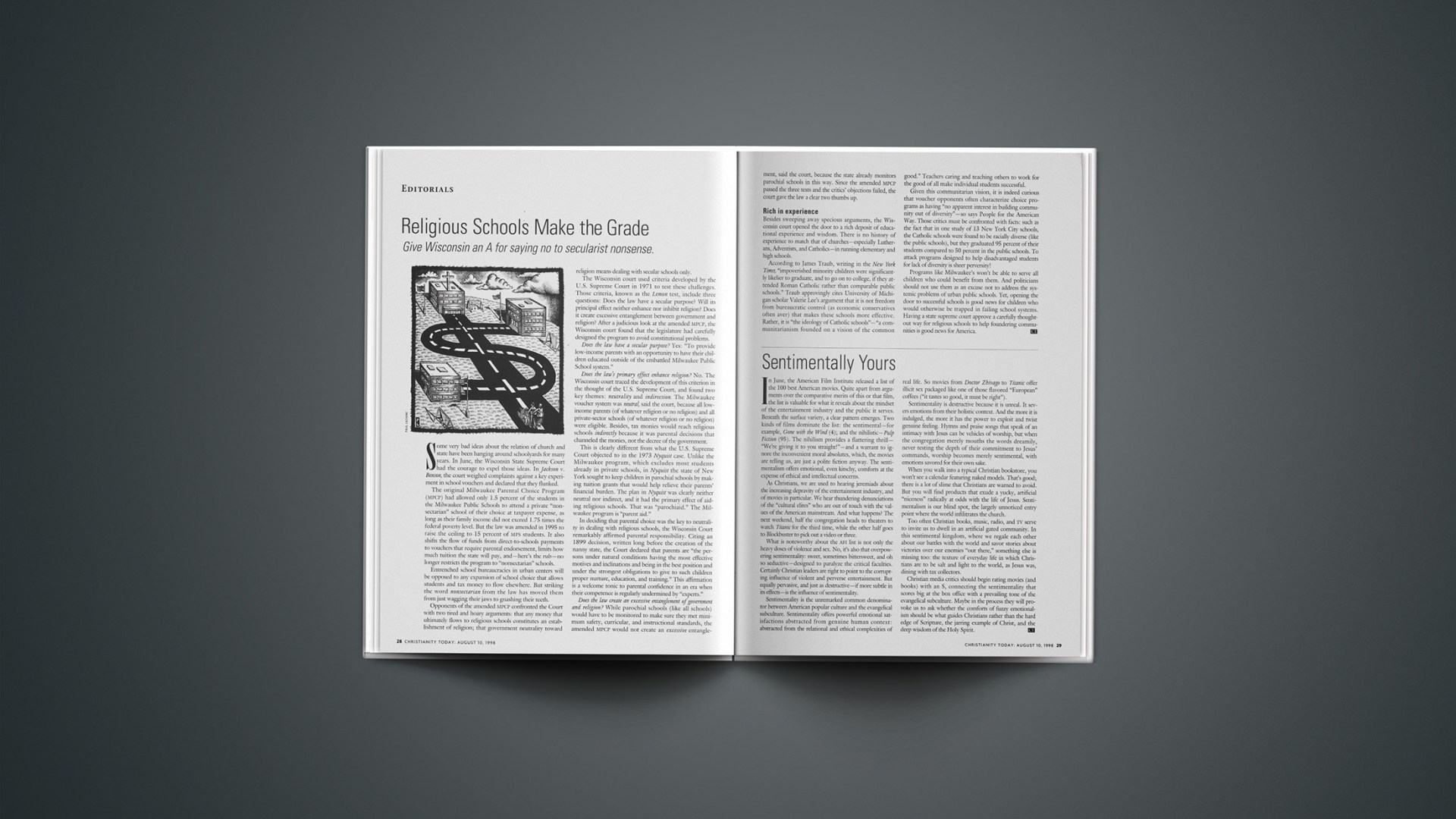In June, the American Film Institute released a list of the 100 best American movies, with Orson Welles’s 1941 classic, Citizen Kane, taking the top spot. Quite apart from arguments over the comparative merits of this or that film, the list is valuable for what it reveals about the mindset of the entertainment industry and the public it serves. Beneath the surface variety, a clear pattern emerges. Two kinds of films dominate the list: the sentimental—for example, Gone with the Wind (4); and the nihilistic—Pulp Fiction (95).
American moviegoers want to have their cake and eat it too. The nihilism provides a flattering thrill—”We’re giving it to you straight!”—and a warrant to ignore the inconvenient moral absolutes, which, the movies are telling us, are just a polite fiction anyway. The sentimentalism offers comfort—and a warrant to indulge in kitschy fantasies.
So what’s new? As Christians, we are used to hearing jeremiads about the increasing depravity of the entertainment industry, and of movies in particular. We hear thundering denunciations of the “cultural elites” who are out of touch with the values of the American mainstream. And what happens? The next weekend, half the congregation heads to theaters to watch Titanic for the third time, while the other half goes to Blockbuster to pick out a video or three.
What is noteworthy about the AFI list is not only the heavy doses of violence and sex. No, it’s also that overpowering sentimentality: sweet, sometimes bittersweet, and oh so seductive—designed to paralyze the critical faculties.
What does that smell remind you of? Yes: “Christian” bookstores. “Christian” radio. “Christian” music.
Sentimentality is the unremarked common denominator between American popular culture and the evangelical subculture. Sentimentality offers powerful emotional satisfactions abstracted from genuine human context: abstracted from the messiness and pain and complexity of real life. So movies from Doctor Zhivago to Titanic offer illicit sex packaged like one of those flavored “European” coffees.
When you walk into a typical Christian bookstore, you won’t see a calendar featuring a photo of a transvestite for each month of the year. That’s good; there is a lot of slime that Christians are warned to avoid. But you will find that a pervasive air of unreality hangs about the place: a yucky, artificial “niceness” radically at odds with the life of Jesus.
Too often Christian books, music, radio, and TV invite us into a gated community where every leaf, every twig is stamped with the Christian Seal of Approval. In this sentimental kingdom, where there are no Bad Words, something else is missing too: the texture of everyday life in which Christians are to be salt and light to the world, as Jesus was, dining with tax collectors.
Certainly Christian leaders are right to point to the corrupting influence of violent and perverse entertainment. But far more pervasive, and just as destructive—if more subtle in its effects—is the influence of sentimentality.
Sentimentality is destructive because it is unreal. And the more it is indulged, the more it has the power to exploit and twist genuine feeling. Hymns and praise songs that speak of an intimacy with Jesus can be vehicles of worship, but when the singer or listener repeats the words dreamily, never testing the depth of his commitment to Jesus’ commands, worship becomes diluted with fantasy, and emotions that have no real meaning when taken out of their proper context are savored for their own sake.
Christian media critics need to begin rating movies with an S, connecting the sentimentality that scores big at the box office with a prevailing tone of the evangelical subculture. Maybe in the process they will provoke us to ask whether it is desirable for Christians to spend most of our time in tightly sealed zones created exclusively by and for fellow believers.
Copyright © 1998 Christianity Today. Click for reprint information.









